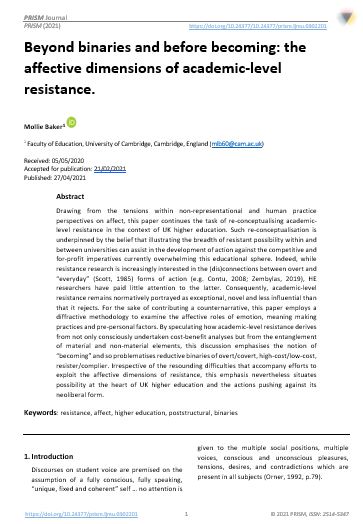Beyond binaries and before becoming: Reconsidering resistance in UK higher education
DOI:
https://doi.org/10.24377/prism.ljmu.0302201Keywords:
Affect, Resistance, Higher education, poststructural, binariesAbstract
Drawing from the tensions within non-representational and human practice perspectives on affect, this paper continues the task of re-conceptualising academic-level resistance in the context of UK higher education. Such re-conceptualisation is underpinned by the belief that illustrating the breadth of resistant possibility within and between universities can assist in the development of action against the competitive and for-profit imperatives currently overwhelming this educational sphere. Indeed, while resistance research is increasingly interested in the (dis)connections between overt and “everyday” (Scott, 1985) forms of action (e.g. Contu, 2008; Zembylas, 2019), HE researchers have paid little attention to the latter. Consequently, academic-level resistance remains normatively portrayed as exceptional, novel and less influential than that it rejects. For the sake of contributing a counternarrative, this paper employs a diffractive methodology to examine the affective roles of emotion, meaning making practices and pre-personal factors. By speculating how academic-level resistance derives from not only consciously undertaken cost-benefit analyses but from the entanglement of material and non-material elements, this discussion emphasises the notion of “becoming” and so problematises reductive binaries of overt/covert, high-cost/low-cost, resister/complier. Irrespective of the resounding difficulties that accompany efforts to exploit the affective dimensions of resistance, this emphasis nevertheless situates possibility at the heart of UK higher education and the actions pushing against its neoliberal form.
Downloads

Downloads
Published
Issue
Section
License
Copyright (c) 2021 Mollie Baker

This work is licensed under a Creative Commons Attribution-NonCommercial-NoDerivatives 4.0 International License.
Authors retain copyright and grant the journal the right of first publication with the work.
The version of the article published as part of this issue is licensed under a Creative Commons Attribution-NonCommercial-NoDerivatives 4.0 International Licence and allows others to read, download, copy, distribute, print, search, link to the full text of the first version of this article, or to use it for any other lawful purpose in accordance with the license. The author maintains copyright for the article published in this journal.
This journal provides immediate open access to its content and has no submission or publication fees.


